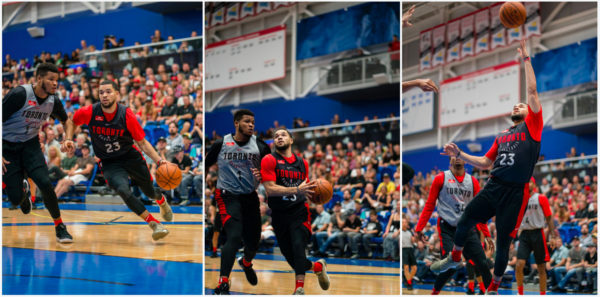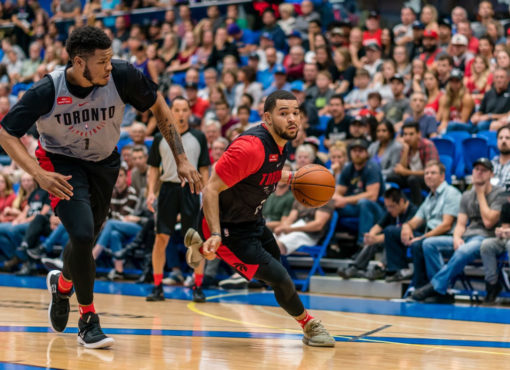Our interview with NBA’s breakout bench star Fred VanVleet
In team sports, there are few positions more concerned with bringing out the best in teammates than point guard, the basketball player who initiates a team’s offense.
When you look up the best two-, three-, four-, and five-man combinations in the NBA this season, only two point guards appear in the top 15 of each. The first is Ben Simmons, a nearly seven-foot-tall generational talent capable of switching between all five positions, picked first overall in the 2016 draft. The second is Fred VanVleet, a normal-sized man who went undrafted in 2016 and spent more of his first season in the minor league than the NBA.
VanVleet (aka FVV) doesn’t have the transcendent individual abilities of the league’s elite PGs. But what he’s shown, from the Illinois high school circuit to the NBA playoffs, is the ability to fit in at any level and keep a team running regardless of how much talent his team or his opponents have.
The Raptors’ FVV has broken out this year leading the league’s best bench, a cohesive collection of underdrafted young players that has pummelled opposing reserves while the starters rest. He’s gone from understudy to convincing duplicate of Raptors star Kyle Lowry: a small point guard who plays bigger than he is through dogged defense and an elite three-point shot. His bench mob’s dominance has propelled Toronto to a franchise-high 59 wins and VanVleet into consideration for the league’s 6th Man of the Year and Most Improved Player Awards.
So how do you go from hard-knock Illinois to the Missouri Valley Conference to a league now named after a sports drink to playing a key role for the number one seed in the NBA’s eastern conference?
You follow the approach that has served FVV’s so well that he prints it on t-shirts: bet on yourself.
College life
VanVleet took a gamble and headed to lesser-known Wichita State, where over four college seasons he powered them to a Final Four berth, an undefeated regular season, and twice as many March Madness appearances as they’d had in the previous 20 years. He became one of NCAA ball’s signature stars, immediately recognizable in the bright yellow of the Shockers and a sharply-angled beard and haircut combo outlining his face like an Iron Man mask.
But despite his NCAA success, pro teams doubted VanVleet had NBA size or much remaining upside. So he again bet on himself, rejecting draft offers that required him to play full-time in the Development League in his first year, and went undrafted. His bet paid off — Raptors General Manager Masai Ujiri surprised observers by giving FVV a two-year contract in July 2016 and then the final roster spot in September, despite already having three point guards.
VanVleet played sporadically in his first year, tallying just under 300 minutes across 37 games. In between those NBA appearances, he was leading the Raptors’ minor-league team to a 39–11 record. The week after being Player of the Game in the Raptors905’s D-League championship win, VanVleet was playing respectable playoff minutes against Lebron James and the defending NBA champion Cleveland Cavaliers, finishing plus-9 in a series the Raptors lost by 61.
That ability to adapt to any level of competition has defined VanVleet’s career. Although known for his bench play, FVV is equally impressive with Toronto’s top line. Coach Dwane Casey’s frequent end-game lineup of the four main starters plus VanVleet outscored opponents by 24.6 points per 100 possessions — the 10th-highest margin of all five-man combinations in the NBA. Not bad for a man who was logging games in the minors a year ago.
We talked to VanVleet when the Raptors visited UVic for their preseason training camp and got him to reflect on his university experiences.
This interview has been edited for clarity.
What’s it like being back on a university campus after having so much success as a college athlete?
It’s cool, man, just to be around the school and to see the fans that showed up. It’s hard to find passion like that anywhere but a university campus, especially a place like this where they don’t get to see the Raptors very often.
What do you miss most about Wichita?
[It turned into a second home for me, so I definitely miss it. I miss all my friends there. I don’t miss school, [but] I miss the people that worked at the school. Academic advisors, coaches, the staff. People that you grow close with, that become your family. I miss Wichita a lot but obviously I’m on to a bigger thing in my career.
Did majoring in sociology inform your impression of Canada when you moved here?
People kind of transcend everything. So no matter where you go, there’s going to be some sort of culture, and all people have some kind of similarity. So it’s easy to apply it to another country, a different culture. The things I learned in sociology will help me through the rest of my life. How you deal with people, how to understand people, and why they do the things they do.
Do you have any advice for current students?
I just think you have to find a way to apply it to your real life. That’s what any study does. You can read as many books as you want, but if it doesn’t make sense to you in real life and you can’t draw on experiences and make parallels, it’s going to be hard for it to stick.
For me in sociology, the things that I was learning in the classroom I tried to apply to my real life, tried to dissect what was going on in my life and help myself.
Any grooming tips, since you always have the sculpting on point?
It depends! You can go for it longer. I don’t let [my beard] grow very long, I keep it a little bit shorter and that way I can keep it sharper. But if you grow it out, then it’s gonna be a little more scruffy. You can’t go wrong as long as it makes sense to you.









